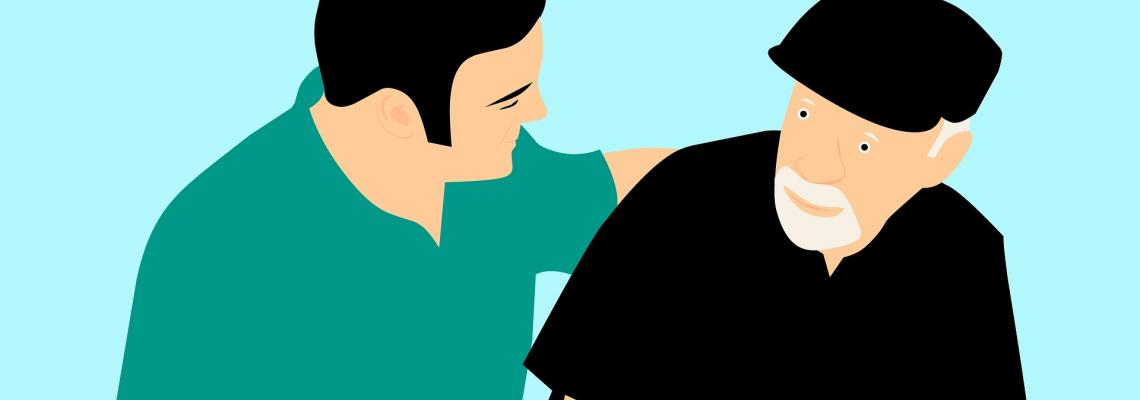The elderly
World Alzheimer's Day
FAMILY CARERS
World Alzheimer's Day is an opportunity to highlight the crucial role of family carers in supporting people who are suffering from Alzheimer's disease or who present with related cognitive disorders.
Since the opening of the Monaco Gerontology Coordination Centre
(C.C.G.M.) in 2006 and the Speranza-Albert II Centre in 2007, taking account of the role of the family carer has been a strong institutional commitment. When this pathology is expressed within a family, it does not just concern the patient, but also has an impact on the whole family environment, in particular the spouse and/or the person who lives with the affected person.
- Who are family carers?
The profile of the family carer, as observed over the past 17 years, is a spouse or a child. A family carer is generally a husband or wife who has lived with the affected person for more than 40 years, or a child, often a daughter, all of whom are very committed to supporting the person affected by the disease.
- A request for help: often at a late stage …
The decision by the carer to ask for help is often made in a state of exhaustion or crisis; the carer has to cope alone with a multi-tasking programme 24 hours a day, 7 days a week. However, this decision is often difficult to take, because it reflects the carer's feeling that it is impossible to continue to take responsibility alone, to bring to light what he or she has sometimes hidden to protect those around him/her, in order to protect them, or which those persons have not yet noticed. However, it is an expression of genuine exhaustion when faced with the seriousness of disorders that can lead to social isolation (pathological agitation, wandering, increasing requests for help with aspects of daily life, etc.).
- What should I expect?
The first interview will be based above all on listening, recognising the commitment and removing the guilt. Although the professional may be tempted into offering help immediately, the success of a support plan for the carer will depend on this time of listening and on respecting the pace of decision-making of the carer and the person being cared for, to which the professional will have to adapt his or her own pace.
Creating a support plan together means sharing in the couple's privacy, sometimes expressing mutual commitments that have been made throughout their lives, sometimes drawing attention to a family dynamic, and, finally, accepting the reality of a disease for which a diagnosis may not yet have been made, even though this medical step is the most important advance in recent years.
Following on, support will consist of assessing the situation in the context of the person's life. In these delicate situations, the carer will become a full partner of the medical and social team. Sometimes, the patient's acceptance of the Standardised Gerontological Assessment will begin with tests given by the carer, in order to play down the significance of the interview.
- Diagnosis:
An assessment of autonomy in daily life, carried out by a doctor from the C.C.G.M., means that it is possible to have a holistic approach to the individual, with an expert gerontological approach. An interdisciplinary analysis of this assessment will reveal any cognitive disorders. If such disorders are found, a referral to the gerontological network's memory centre will make it possible to carry out an expert investigation in order to make a diagnosis.
- The support plan:
At this stage, a specialised hospital-focused approach will complement the holistic approach and will enable the C.C.G.M. to put forward a support plan that is adapted to the person and those close to them. As part of these recommendations, the Speranza-Albert II Centre, a therapeutic day centre in the Principality, will be proposed, the main aim of which is to re-establish social interaction by offering a programme of non-medicinal therapeutic activities, and also to give the family carer one or two days of respite each week.
- Financial assistance: the Autonomy Allowance
These days at the Centre may be covered by the Autonomy Allowance, financial assistance established in 2007 to help manage dependency, which can have a significant impact on the family budget.
- Never alone again:
The C.C.G.M. will invite the family carer to take part in discussion groups, where he or she can meet other carers, talk to them and obtain information about the disease and advice on communication techniques, for example, in order to minimise behavioural problems resulting from the disease.
Studies show the burden shouldered by family carers and the consequences of this role on their mental health (anxiety, depression, etc.) and their physical health (such as cardiovascular diseases, cancers, and the impact on their life expectancy). Social recognition and perceived support, over and above the actual help offered, already contribute in themselves to lightening the carer's burden.
Information and foresight are now the areas for improvement that the C.C.G.M. wishes to develop in order to facilitate carers' access to support. Preventing and putting an end to the feeling of isolation will help facilitate support with this burdensome task.
Philippe Migliasso
C.S.S. Administrator of the C.C.G.M.
